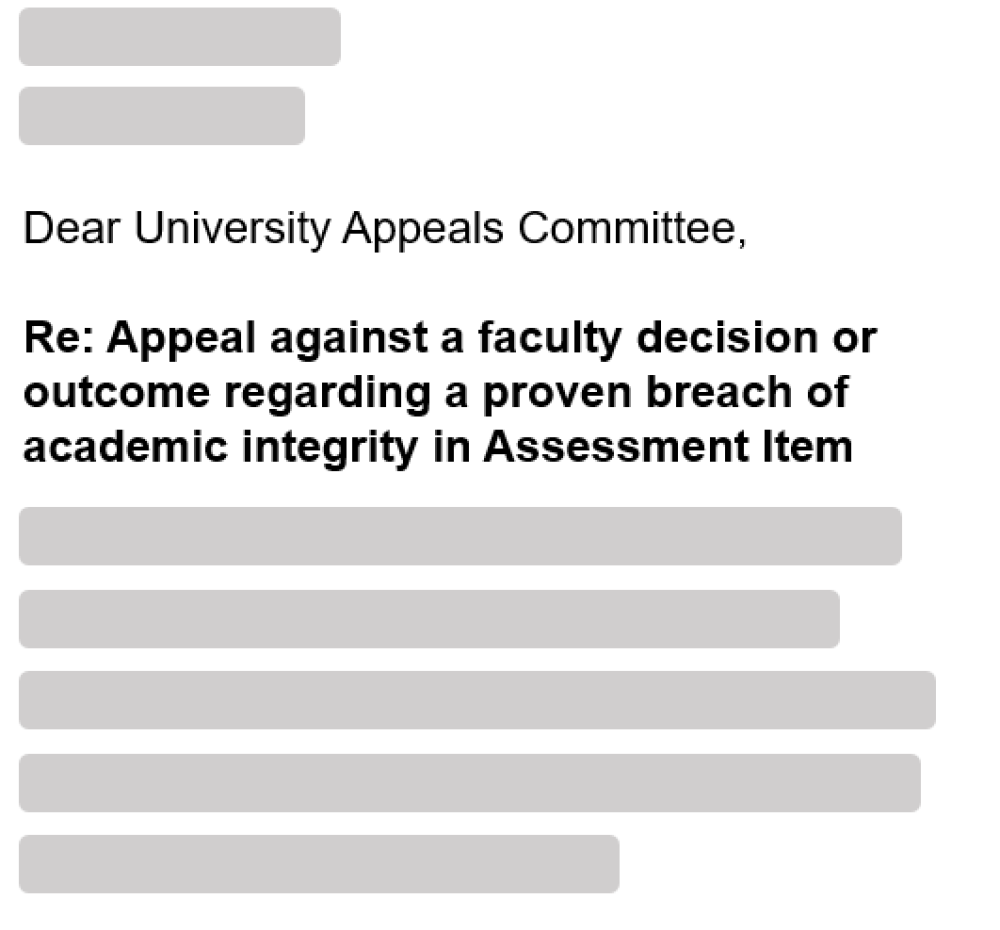If you have received the outcome of an academic integrity breach allegation and you would like to appeal the outcome, please contact our Advocacy team for a free appointment. Our experienced team can support you through the process.
What is an appeal of an academic integrity breach outcome or decision?
- Decisions and outcomes imposed by Faculty Academic Integrity Committees can be appealed to the University Appeals Committee (UAC).
- After a Faculty Academic Integrity Committee decides the outcome of an allegation of academic integrity breach, they will email you an outcome letter. This letter will include information about the reasons for their decision and the possibility of appealing the decision/outcome.
- You can also find more information on the Deakin University Appeals webpage.
Which Deakin policies apply to the appeals process?
On what grounds can I appeal an academic integrity outcome to a higher committee?
Generally, students may appeal to the University Appeals Committee (UAC) against a Faculty Academic Integrity Committee decision/outcome on one or more of the following four grounds:
a) A misapplication of process occurred that resulted in material disadvantage to the student;
b) The decision was manifestly wrong;
c) The outcome imposed by the original decision maker was manifestly excessive, inappropriate or not available in the circumstances;
d) New evidence that was not known or available at the time of the original decision is now available and could have affected the outcome of the decision (Academic Board Regulations, Part 11).
Contact a DUSA Advocate for free advice about which ground/s may apply in your individual case.
I admitted to a breach. Can I still appeal to the University Appeals Committee?
It depends on the circumstances:
- If you admitted to a breach and accepted a Standard Outcome (without review), it is not possible to appeal the decision or outcome to the University Appeals Committee.
- If you admitted to a breach and this was considered at an Academic Integrity Review Meeting, you can only appeal the outcome imposed by the Faculty Academic Integrity Committee (Student Academic Integrity Procedure, 67-70). DUSA Advocates can provide free individualised advice to you.
How do I prepare an appeal?
If you believe that one or more of the grounds of appeal apply and you want to appeal to the University Appeals Committee (UAC), you need to follow the steps outlined here.
First, you will need to read the documents you received from the Faculty Academic Integrity Committee:
- the original Allegation Letter
- the original Evidence File/Binder
- the Outcome Letter (which contains the substantiated/proven outcome from the Faculty Committee and the reason for decision).
Then you will need to prepare:
- An Appeal Statement which details the ground/s of your appeal and outlines the case for your appeal (see below for a template you can use to draft your Appeal Statement), and
- Relevant documents/evidence in support of your appeal (e.g. medical certificate/report, letters of support, statutory declaration, evidence of integrity, etc). Note: All documents must be in English; a certified translation must accompany documents in another language.
When must I lodge an appeal by?
- You have 20 working days from the date of the Faculty Academic Integrity Committee’s outcome letter to lodge an appeal submission.
What happens next?
- The UAC Chair will review your appeal submission to determine whether it meets the grounds for lodging an appeal.
- The UAC Chair may either dismiss your appeal or decide to hear your appeal.
- If they decide to hear your appeal, the UAC Chair can either determine the matter on the basis of the written material alone or they can conduct an appeal hearing.
- If the UAC decides to hold an appeal hearing, you will receive at least 5 working days’ notice of the hearing date and time.
What happens at the appeal hearing?
- Appeal hearings usually happen via video-conference.
- Appeal hearings are attended by at least 3 members of the UAC and the UAC secretariat.
- The UAC must limit the evidence it hears to matters relevant to the ground/s of appeal.
- You will have the opportunity to present your case, focused on the ground/s of appeal that the UAC agreed to hear. You may also respond to any further documents/ statements the Faculty Academic Integrity Committee may have provided to the UAC in response to your appeal submission. The UAC members will ask you some questions and you may also ask questions.
- If you have a support person at your appeal hearing, they may also be allowed to speak. Your support person can be anyone who is not a practicing lawyer. DUSA Advocates often accompany students to appeal hearings. If you want an Advocate at your appeal hearing, please request this as soon as possible.
What are the hearing outcomes?
After conducting the hearing, the UAC can decide either to dismiss the appeal or to uphold the appeal in whole or in part.
If they decide to uphold the appeal, they then either:
- Make a new finding,
- Impose outcomes (from the relevant Schedule of Outcomes), and/or
- Refer the matter back to the original decision maker to be re-heard in whole or in part (Academic Board Regulations, Part 11).
Where the only successful ground of appeal is the outcome (i.e. the penalty) was manifestly excessive/ inappropriate/ not available in the circumstances, the UAC may vary the outcome (penalty) but may not vary the decision of finding the allegation of breach to be substantiated. The UAC’s decision is final within the University.
Where can I get further assistance with my appeal? A DUSA Advocate can:
- Provide advice on possible grounds of appeal and discuss what you could include in your appeal submission
- Provide feedback on your draft appeal submission.
- Attend the UAC hearing with you (if a hearing is granted).
- Provide support and advice during any stage of the appeals process.
Please note that DUSA Advocates experience very busy periods, particularly at the end of each trimester where we need to assist a large number of students, so it is important that you book an appointment to see an Advocate as early as possible. For more information or to speak to an Advocate about your individual situation, please contact us. If you are considering an appeal, we recommend scheduling an appointment with a DUSA Advocate for advice that is personalised and specific to your circumstances. While DUSA makes every effort to ensure that the information provided is accurate and up-to-date, DUSA expressly excludes responsibility for any errors or omissions.




